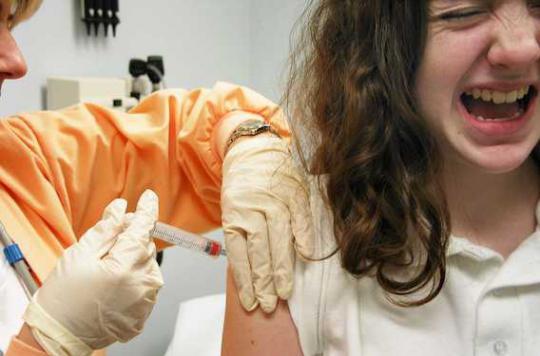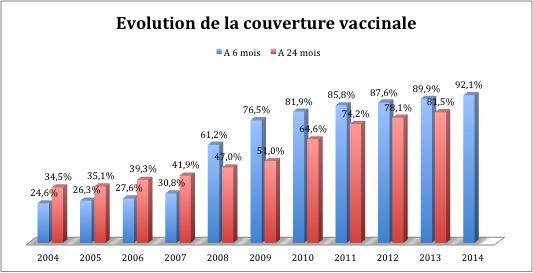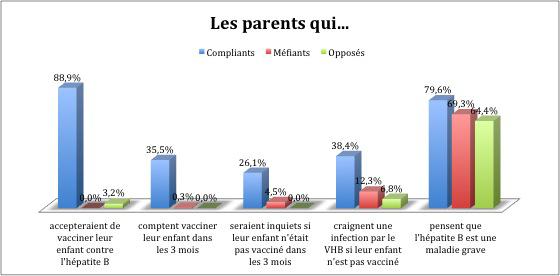Vaccination coverage against hepatitis B is considered satisfactory in France. But parents’ attitudes towards vaccination remain mixed.

Despite controversy and hesitation over vaccination, the French massively protect their children against hepatitis B. On the occasion of World Hepatitis Day, the Institute for Health Watch (InVS) is devoting its Weekly Epidemiological Bulletin ( BEH) to the hesitations of the population. Only a minority expresses a categorical rejection of vaccination. More are those who wonder.
92% of infants aged 6 months and born in 2014 have started a vaccination against the hepatitis B virus. A real explosion since 2008, date of admission of the hexavalent vaccine for reimbursement. Despite the various controversies surrounding this product, in particular accused of being the cause of autoimmune diseases, it remains in great demand. In adolescents, however, a stagnation around 45% is observed.

40% of parents have vaccinated
There is evidence of growing adherence to hepatitis B vaccination. But what are the positions of the families? This is the question that was asked of 5,922 parents, interviewed online. Distrust has been alive since the emergence of multiple sclerosis cases among vaccinated adolescents in the 1990s. Attitudes “can range from total support to rejection of vaccinations, including delayed or even incomplete vaccination. They write. But more and more parents express a critical position vis-à-vis certain vaccines. The example of hepatitis B illustrates this well.
4 in 10 parents say that all their children are vaccinated. 26% are not sure of the vaccination status of their offspring. The latter are mainly men or people without diplomas. For them, “the electronic vaccination record already tested in certain regions could be a good tool for monitoring vaccinations. Reminder or follow-up systems (telephone or email) to notify people that their children are the target of vaccine recommendations have already proved their usefulness, ”the BEH article specifies.
Positive dads
Among parents of unvaccinated children, three profiles can be distinguished. They all take a different stance on vaccination. The authors of the BEH separate them between “compliants”, “suspicious” and “opposed”.
Compliant parents (17% of the subgroup, 5.5% of the total workforce) have not vaccinated their child, but would be ready to do so the same day if their doctor suggested it. They also intend to make this gesture during the following quarter and think it is an easy thing. The members of this group are rather men, young parents and often belong to the socio-professional category of employees and workers.
“The people we qualified as compliants did not vaccinate their children and did not particularly intend to do so, but their attitudes towards vaccination were the least unfavorable and they could have comply with the recommendation if the opportunity arose, specify the authors of the BEH. Easier access to vaccination and an increase in vaccination opportunities could increase the vaccination coverage of these children. “
More suspicious mothers
Distrustful parents (47% of the subgroup, 14.5% of the total workforce) would not vaccinate their child the same day, but they are not formally opposed to this medical gesture. If they are aware that hepatitis B is a serious illness, they are not worried that their child will contract it if they are not protected. These parents rather belong to the higher socio-professional categories, and have high incomes.
Parents opposed (36% of the subgroup, 11% of the total workforce) to the hepatitis B vaccination do not think that this gesture is a good thing or easy to achieve. Moreover, 5% of them are against any vaccination and none intends to protect their child during the next three months. Women are more numerous in this group, as are those over 35.

To promote vaccination, conclude the authors of the BEH, the provision of vaccines in the office of the general practitioner could be an effective measure. She is also experienced in Poitou-Charentes. The diversification of places of vaccination, in particular by making the most of pharmacies, is also appreciable.
Doctors’ attitude towards the hepatitis B vaccine
Doctors are not on the same wavelength as their patients with regard to the hepatitis B vaccine. They perceive their patients as reluctant but remain confident about this protection. 90% are fully immunized and three quarters have protected their children.
For 48% of general practitioners, the link between hepatitis B and multiple sclerosis is “not at all probable”. Moreover, they quite easily obtain the adhesion of the adolescents who are not vaccinated. However, they do not always detail the diseases targeted by the hexavalent vaccine. One in five does it sometimes or never.
But even in this population, reluctance is observed. 34% of general practitioners routinely offer the hepatitis B vaccine to adolescents, but 10% never do.
.















